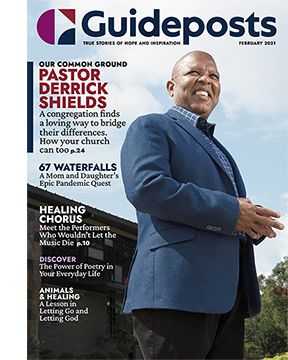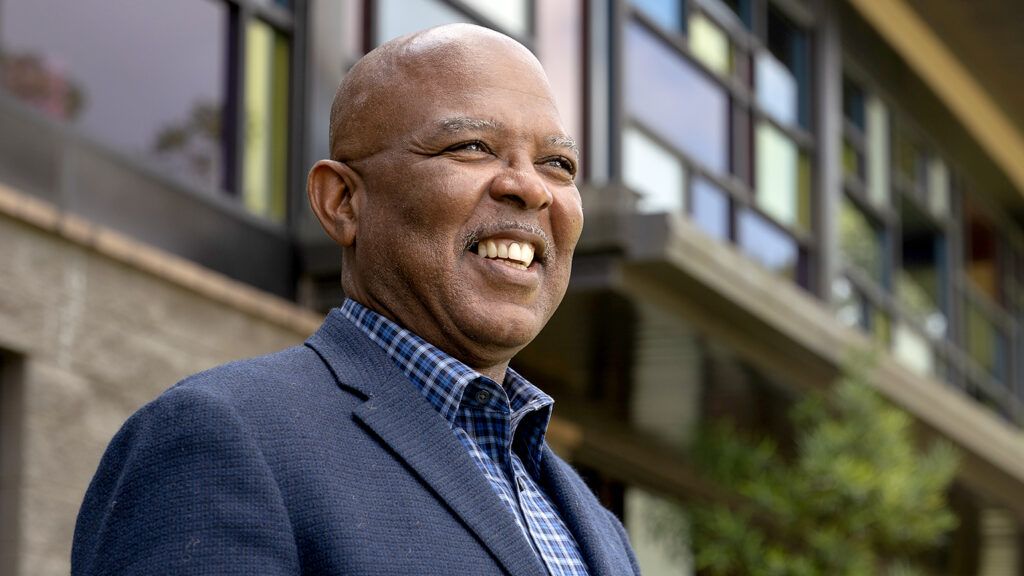Three simple words that have divided our nation. Black lives matter.
Even at the church where I am lead pastor—a multiracial congregation founded more than two decades ago—there isn’t universal agreement about the meaning or significance of those words.

issue of Guideposts
Yet our disagreement is not bitter. We don’t all agree. We love each other anyway. We keep talking. We keep worshiping. We acknowledge our common bond in God. We don’t pretend to have all the answers.
I have preached about racial justice here at Christ Community Church, which was founded with an intention of bridging the racial divide in Columbus, Georgia. I have encouraged the formation of small groups to discuss this vital issue. Some members of our church joined peaceful protests in Columbus. Other members did not.
Here’s one thing I know. Jesus commands us to love God and others—and no wiggle room in the word others.
At Christ Community, we do that by getting to know one another. We ground ourselves in the love of God and build trust through friendship with people of different backgrounds.
We are a rarity in America: a proudly multiracial church where differences are neither fought over nor swept under the rug.
How do we do it? In one sense, we don’t. God does it. We see our job as trusting God and, with his help, learning to trust one another. Trust enables us to disagree and express our feelings about difficult issues without coming apart.
It’s not a random choice. Jesus’ ministry was founded on relationships. Jesus didn’t grab the spotlight of his day and hobnob with people in power. He traveled around a remote corner of the Roman Empire, making friends with whoever crossed his path and speaking the truth about God. When he died, a handful of friends stuck by him.
And yet he changed the world.
The road to where we are at Christ Community was not easy. We made mistakes and learned. Above all, we learned how to experience God’s love in the midst of—maybe even because of—our differences. I tell our story in hopes that it can help you do the same.
I am not the founder of Christ Community. I succeeded the founding pastor, Keith Cowart. Keith, who is white, grew up in a small segregated town in Georgia, where his friends’ parents pulled their kids out of public schools following desegregation. Keith’s parents
believed in public education and kept their son there.
Keith was called to ministry early and became a Free Methodist pastor after college and seminary. At his first church, in another small Georgia town, members forced him to cancel an after-school program because they objected to Black children using the church basketball court.
Keith left that church and settled in Columbus, determined to make racial reconciliation the heart of his ministry. Together with a few friends, he and his wife started a new church in their living room and later located the sanctuary where railroad tracks once divided the white and Black neighborhoods of Columbus.
Despite extensive outreach to the Black community, the new church remained stubbornly white. Keith could not figure out why. At last he committed the congregation to a week of prayer. “We can’t seem to crack this nut,” he said to God. “Help us.”
Black people began showing up at church. “God told us to check this place out,” they said.
Keith listened to new members and learned that key to being a truly welcoming church is putting a diversity of people up front and playing a variety of music during worship. Newcomers know that they belong because they see people who look like them.
Keith invited Black members into leadership. He broadened the music mix. He preached about racial justice and reconciliation.
And he began encouraging members to join small groups that met in people’s homes for meals, Bible study and friendship.
It was the small groups that cemented the church’s identity. The groups were designed to mix people from different backgrounds. It’s one thing to open up in prayer with people just like you. It’s a whole new level of trust to be vulnerable with someone whose life experiences are very different from yours.
That’s what brought me to Christ Community and to ministry.
I served in the Army for 20 years, then retired and went into real estate. I read Rick Warren’s book The Purpose-Driven Life and felt a call to share Jesus with others. But I didn’t know how.
I attended a weekend Methodist retreat called Walk to Emmaus. I was the only Black person participating, an unusual situation for someone who served in the military, which I found racially diverse.
Praying and sharing my feelings with this group of men who were so different from me was transformative. We connected on a deep level, finding our common bond in God. I wanted more of that.
My wife, Andrea, also participated in Walk to Emmaus. Keith happened to be the spiritual director of the cohort she was in. Andrea was struck by his friendliness and his commitment to racial justice. She suggested checking out his church.
Stepping through the doors of Christ Community, we knew we’d found home. Keith helped us connect with the congregation and encouraged my interest in ministry by giving me leadership positions.
I attended seminary and was ordained a Free Methodist pastor. When Keith was called to be a bishop in 2018, Christ Community chose me to replace him.
Since the death of George Floyd last year and throughout the nationwide racial justice movement that followed, I have done my best to steer our congregation through a tumultuous time while also navigating the Covid-19 pandemic.
I have preached about God’s commandment to Christians to love all people and be a force of healing in a nation with racial wounds. Christ Community has provided online resources about racial justice and connected members with online conversations in our denomination. I invited members to join me at peaceful protests.
The heart of our approach has been personal. We have 26 groups, mostly of 12 to 14 members, in our 900-member congregation, plus groups devoted specifically to prayer. Each group has a different focus: fellowship, Bible study, jail ministry, healing.
I encouraged the formation of a new group focused specifically on racial reconciliation. Members of that group will go on to start their own groups on the topic. The idea is to gather different people together, get to know one another, pray, study God’s Word and, with that foundation, talk through difficult questions about race.
For some members at Christ Community, the words Black lives matter are a rallying cry. Others hear a devaluing of other races. It can be a struggle to remain loving with people who disagree about fundamental issues. We think it’s a struggle worth waging. God helps us persevere.
You’d be amazed how overcoming one barrier can help people overcome others. Brad and Amanda Newman began attending Christ Community about six years ago after making the difficult decision to leave their previous church.
Brad and Amanda encountered a warm welcome at Christ Community, but they also encountered something more: our small groups, where people from different backgrounds open up to one another in a spirit of trust.
“When you know the details of people’s lives and what their hurt was, it opens up your heart in new ways,” Amanda says. “It becomes safe to ask questions. Where we are weak, God is strong.”
One of my favorite stories in the Gospels is Jesus’ encounter with the woman at the well. The story takes place in a region called Samaria. Jews and Samaritans regarded one another as enemies. They disagreed about fundamental theological issues. To Jews, Samaritans were unclean.
If you want to feel the full impact of this story, picture a person with whom you disagree profoundly. Now picture an entire neighborhood full of people like that.
On his way home from a preaching tour, Jesus says to his disciples, we’re going to travel through that neighborhood, the one with all those people you don’t like. And we’re going to hang out there for a while.
To top it off, Jesus strikes up a conversation with a Samaritan woman, something no self-respecting rabbi would do. He offers her the water of life. She recognizes him as the Messiah and runs off to tell everyone she knows. The disciples are shocked.
“A new command I give you: Love one another,” Jesus says to his disciples shortly before his death. He means it.
Like the rest of America, we at Christ Community are feeling our way forward in an uncertain and difficult time. We are not blind to the injustice in our nation. We are aware that we don’t agree about everything.
We also are grounded in the love of God. And we are committed to serving and worshipping together with a common purpose.
That foundation has served us well. We believe that it could also help our nation. We pray that you too can be inspired to reach out to someone different and take a small step toward the healing so many of us seek.
For more inspiring stories, subscribe to Guideposts magazine.






